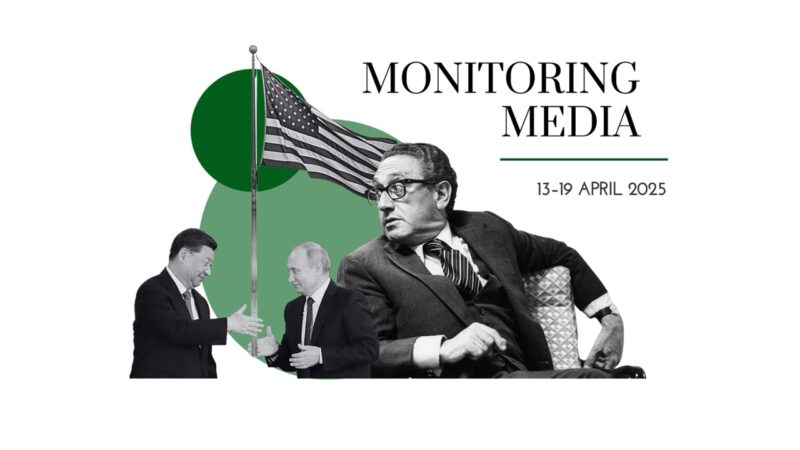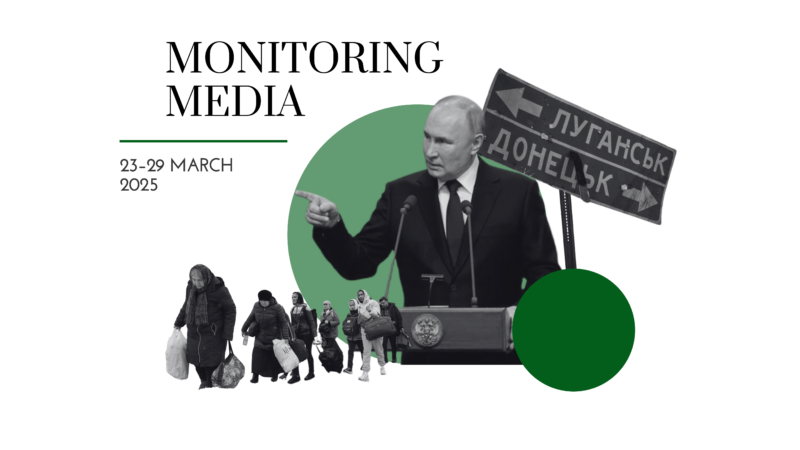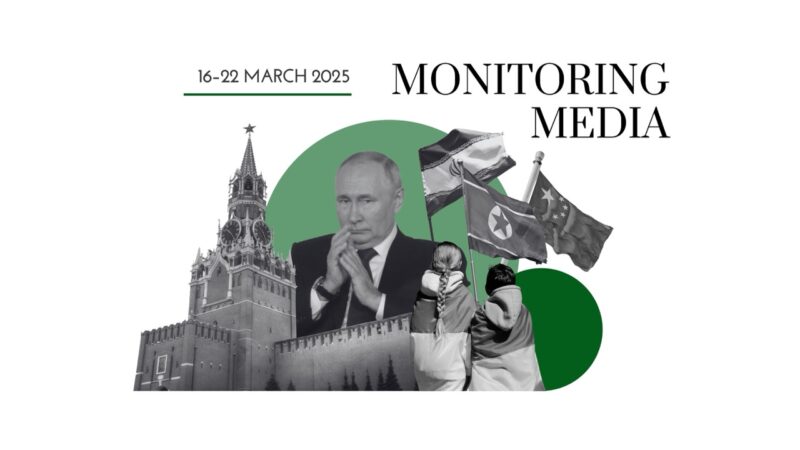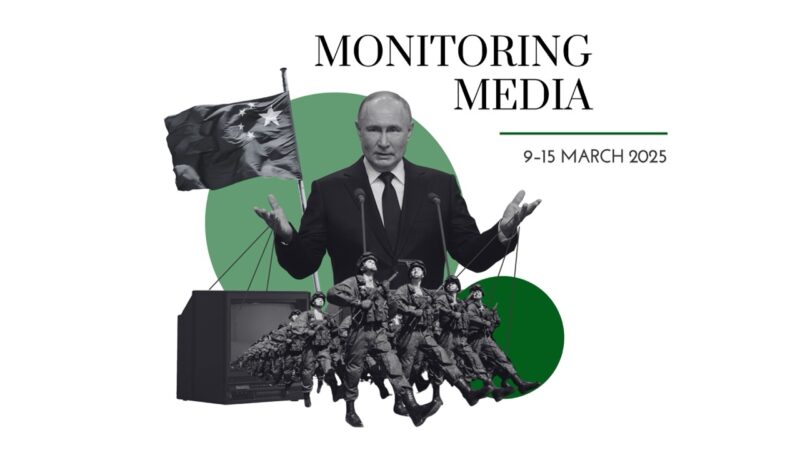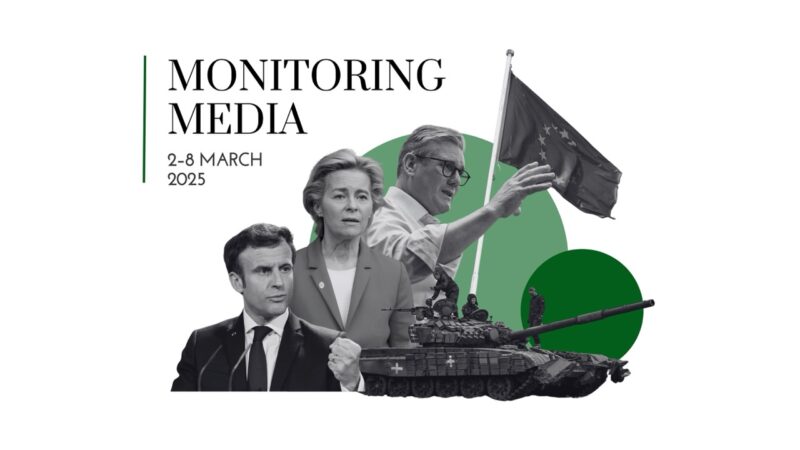Europe can contain Russia
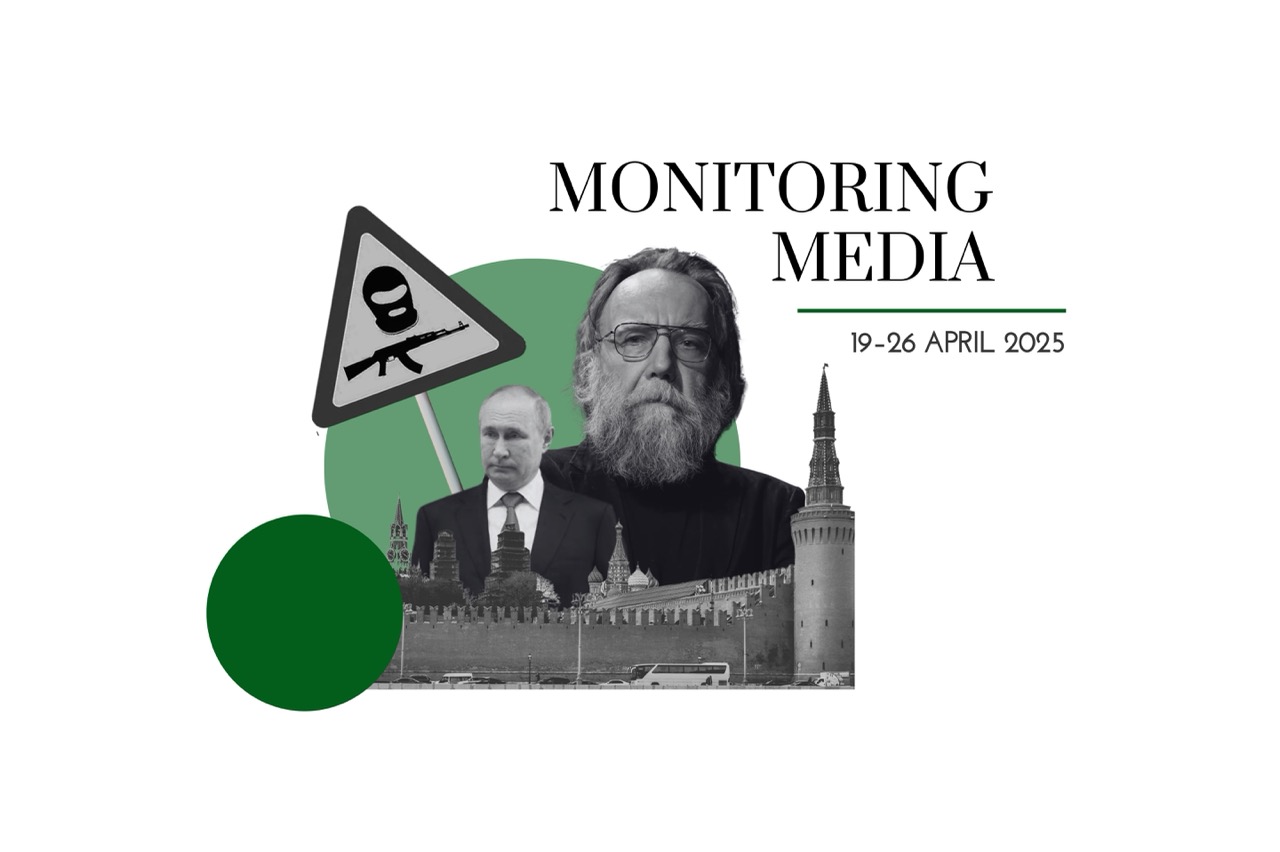
CIUS weekly report on North American media coverage of Ukrainian affairs, 19–26 April 2025
Seven publications (The National Interest, Foreign Affairs, The Wall Street Journal, The Atlantic, The Washington Post, The Globe and Mail, and The New York Times) were selected to prepare this report on how Ukraine has been portrayed in the North American press during the past week. The sample was compiled based on their impact on public opinion as well as on their professional reputation, popularity among the readership, and topical relevance. These publications represent centrist viewpoints on the political spectrum.
This MMS report covers only the most-read and relevant articles about Ukraine, as ranked by the respective North American publications themselves in the past week. Its scope covers promoted articles on home pages and articles from special sections on Ukraine, with the hashtag #Ukraine, from the paper editions of the publications, and about Ukraine from opinion columns and editorials.
Featured topics
- The world and Ukraine: Europe can contain Russia; ‘Muscle mediation’ could help resolve Russia’s war against Ukraine; Trump plans to sell Ukraine to Russia; Trump’s peace plan risks emboldening dictators, undermines US foreign policy doctrine.
- Russia at war: Russia is strengthening its influence in Africa; Putin balances diplomacy, military aggression as Trump seeks Ukraine peace deal.
MMS summaries
Europe can contain Russia. Barry R. Posen (Foreign Affairs) questions the claim that the deployment of European troops in Ukraine will eliminate the Russian threat. This is a bold initiative, but it’s an old idea in a new package: “Europeans can call these forces whatever they want—peacekeepers, peace enforcers, a reassurance force, a deterrent force. But European leaders are simply repackaging NATO’s 1990s Balkan peacekeeping model for Ukraine.” Such a military force would be dispersed and would not have sufficient combat power without US support. In turn, Washington is likely to refuse to provide it. In the author’s opinion, this approach is dangerous for European countries as well: “The continent’s people face many potential threats from Russia, and so it is foolish for them to tie down their readiest forces in garrisons across Ukraine. They may deter Russia there, but the forces would be unavailable for anything else. This kind of mission would lure European armies into rotating units through these positions in a way that doesn’t leave their soldiers far from home for long periods. Every unit will either be getting ready to go to Ukraine, be somewhere in Ukraine, or will just have returned from Ukraine. This routine is not a formula for a combat capable army.” To deter Russian aggression, Europe must “organize what military planners call a ‘mass of maneuver’ that can quickly deploy where it is needed. Europe cannot know in advance whether a refreshed Russia would renew attacks on Ukraine, move forward into Belarus, threaten Poland, or snarl at the Baltics. As a result, its officials must consolidate meaningful combat power that can intervene quickly wherever and whenever needed.” According to Posen, “If Europeans want to deter Russia, reassure Ukraine, defend existing EU or NATO members, or even defend Ukraine, then they need combat power that can match to the challenges posed by Russia’s military. This means assembling a capable mass of maneuver that makes Moscow more cautious when it comes to the continent in every which way. Peacekeeping with American help is old think. Independent combat capability is the necessary new-think in Europe.”
Will ‘muscular mediation’ work in resolving Russia’s war against Ukraine? Alan J. Kuperman (Wall Street Journal) wonders whether ‘muscular mediation’ will work in resolving the Russo-Ukrainian war. Implementing this approach involves four steps: (1) the mediator proposes a compromise, which is usually rejected by at least one side; (2) the mediator pressures on that side to weaken militarily until it accepts the offer; (3) the mediator pressures the other side to demonstrate that neither side will be allowed to win, after which both sides agree in principle to the compromise; (4) the parties negotiate the details. According to the author, there are four key factors why this approach does not always work. The first coercion — forcefully threatening one side—is hard to make credible. The second coercion—threatening the other side—is even harder to make credible. Third, excessive demands can backfire: “This danger arises if the mediator tries to coerce one side to surrender a vital interest, but inadvertently provokes a military escalation.” Fourth, the mediator must have enough leverage—and be willing to use it: “In some cases, however, the mediator proves unwilling to use its coercive power due to competing interests.” Two obstacles to applying this approach to Russia’s war against Ukraine have already been overcome, but two more remain: “First, Mr. Trump must decide that peace in Ukraine is more important than coziness with Russia. Then he must confront Mr. Putin with an ultimatum and deadline—in private, to avoid loss of face—either to accept a total cease-fire in return for the lifting of sanctions, or to suffer intensified sanctions and renewed U.S. military aid to Ukraine.” According to Kuperman, “If Mr. Trump is unwilling to play hardball with Russia, he has no hope of forging an agreement. Russia would simply continue taking territory, and Mr. Trump could go down in history as the U.S. president who lost Ukraine.”
Russia is strengthening its influence in Africa. Zineb Riboua (National Interest) argues that Africa is no longer a peripheral arena – it is becoming a central platform for Moscow’s global strategy. Moscow is delaying a peaceful settlement of the Russo-Ukrainian war, thereby distracting Washington from expanding its influence in Africa: “Russia is building military outposts, securing defense agreements, and shifting the regional balance from the Red Sea to West Africa.” Using chaos as a tool, the Kremlin is filling the power vacuum left by the West on the African continent. Moscow’s ambitions in Africa extend far beyond the continent – it sees it as an important centre in the new global architecture of influence. According to Riboua, “Africa is no longer a peripheral arena—it’s becoming a central platform for Moscow’s global strategy. Keep overlooking it, and Russia, Iran, and China will shape the terrain unchallenged. With Moscow securing key corridors and forging new security alignments, Western supply chains could fracture, deterrence could unravel, and Europe could find itself exposed. By the time the West reacts, the balance of power may have already shifted.”
Trump plans to sell Ukraine to Russia. Phillips Payson O’Brien (Atlantic) claims that the Trump administration is offering Kyiv two bad options: either agree to an American peace plan that rewards Moscow for its invasion of Ukraine or refuse and lose Washington’s support in resolving the Russo-Ukrainian war. This one-sided plan gives Moscow everything it desires: (1) Russia gets all the territories it seized during its invasion of Ukraine since 2014; (2) Russia’s invasion of Ukraine is legitimized; (3) Kremlin gets its money back and all sanctions are lifted. In return, Ukraine receives nothing: “The agreement would rule out Ukrainian membership in NATO and put no other security guarantees in place.” According to O’Brien, “Without the strong backing of European countries, Ukrainians might feel forced to accept this terrible deal. They will not want to, because they will be devastated by it. But unless Europe steps up and confronts a dictator-loving U.S. president, Ukraine might have to give in to Trump and Putin.”
Trump’s peace plan risks emboldening dictators, undermines US foreign policy doctrine. Max Boot (Washington Post) warns that the Trump administration’s proposed Ukraine peace plan, developed without consulting Kyiv, risks legitimizing Russia’s illegal annexations and undermining a century-old US foreign policy doctrine. The draft proposal—reportedly negotiated by Trump’s envoy Steve Witkoff without any visits to Ukraine—would offer Russia de jure US recognition of Crimea and de facto acceptance of its control over four other occupied Ukrainian regions—none of which Russia fully controls. In return, Kyiv would receive vague “security guarantees” with no clear US commitment, while Russia would benefit from lifted sanctions and expanded economic ties. “There is not even any U.S. commitment to continue supplying badly needed munitions to Ukraine,” the author notes, highlighting widespread fears that Moscow could use the ceasefire to rearm and resume aggression. Boot argues that this approach would dangerously erode the international norm against wars of conquest—a principle anchored in the 1945 UN Charter and the US Stimson Doctrine, which rejected territorial seizures by force. Ukraine continues to uphold this principle, as President Volodymyr Zelensky said that “Ukraine will not legally recognize the occupation of Crimea. There is nothing to talk about. It is against our constitution.” However, Trump’s online response accusing Zelensky of making “inflammatory” remarks signals a shift away from long-standing American policy. The author notes that rewarding Russia’s aggression would send a perilous signal to other authoritarian regimes, including China. “If Trump tries to bludgeon Ukraine into accepting this one-sided plan, he will be rewarding aggression and making the world a more dangerous place.”
Canada should pledge to officially label Russia a state sponsor of terrorism. Garry Kasparov and Marcus Kolga (Globe and Mail) call on Canada to designate Russia a state sponsor of terrorism, citing recent atrocities such as the Russian Palm Sunday missile strike on the northeastern city of Sumy that killed 35 people and injured nearly 120, including children and the elderly. “This is not just war. It is state-sanctioned mass murder,” the authors describe the attack calling it a “deliberate act of terror” and criticizing Donald Trump for dismissing it as a “mistake” while echoing Russian disinformation by blaming Ukraine for the war. Citing a long list of war crimes—“missiles launched into hospitals, schools and apartment buildings; rape, torture and mass graves in Bucha”—the authors argue that Canada must take a moral stand, especially as other Western actors have moved toward similar designations. Kasparov and Kolga also highlight the ideological roots of Russia’s brutality, pointing to Russian philosopher Alexander Dugin, described as Putin’s ideological mentor, who openly advocates for the destruction of Ukrainian identity. In a recent Russia Today article (Russia Today is a state-controlled international news television network funded by the Russian government; it is banned from the list of non-Canadian programming services), Dugin reportedly referred to Ukrainians as “dogs” and “freaks,” claiming they are subhuman in comparison to Russians. “This is not the language of nationalism – it is the language of genocide, and the philosophical foundation of Mr. Putin’s war,” according to Kasparov and Kolga. The dehumanizing rhetoric, paired with war crimes and cultural erasure, reflects a broader campaign not just to defeat Ukraine militarily, but to wipe it out as a nation. The authors further urge Canada to act by seizing frozen Russian assets and repurposing them to rebuild Ukraine. “Let Mr. Putin’s stolen wealth fund the rebuilding of Ukraine,” the authors write, emphasizing that such action is both a moral obligation and a widely supported policy—citing a Nanos poll showing 90% of Canadians back it. Highlighting that “Russia has committed acts that defy the boundaries of conventional warfare and normal human decency,” the authors stress that all federal parties should label Russia a terrorist state, seize its oligarchs’ assets, and stand firmly on the side of victims—not aggressors.
Putin balances diplomacy, military aggression as Trump seeks Ukraine peace deal. Anton Troianovski (New York Times) writes that Vladimir Putin is carefully balancing diplomacy and military aggression, maintaining close contact with President Trump while intensifying attacks on Ukraine. Despite four recent meetings with White House envoy Steve Witkoff, including a three-hour session on April 25 at the Kremlin, Putin continued to reject a rapid ceasefire. Instead, he openly admitted to bombing a Ukrainian restaurant in Kryvyi Rih, a city in central Ukraine, claiming it was used by people “deserving the most serious punishment.” The Kremlin remains optimistic about future US-Russia cooperation, with one aide saying the talks helped “bring the positions of Russia and the United States closer together.”Putin’s strategy appears focused on sustaining military pressure while extracting maximum leverage in ongoing negotiations, Troianovski writes. Russian political scientist Grigorii Golosov said the president believes that “he can gain benefits not only in terms of seizing territory, but also in terms of undermining Ukraine’s defense capability and demoralizing the Ukrainian population.” While the Trump administration has floated a peace framework reportedly recognizing Crimea as Russian territory and freezing the front lines, Putin has continued launching brutal airstrikes, including one that killed three people in Pavlohrad, including a child, signaling that he sees more to gain through continued violence than diplomacy. Still, the author believes, there are signs that Putin may be preparing to recalibrate. Russian elites and influential media figures have hinted that a deal could be possible if Ukrainian forces are fully expelled from key areas such as the Kursk region. “As soon as the last half percent is liberated, the troops can stop where the news finds them,” wrote prominent editor Konstantin Remchukov. He argued that the “foreign policy preconditions” for ending the war now exist thanks to Trump’s presidency, including potential sanctions relief, asset recovery, and renewed commercial ties with the West.
